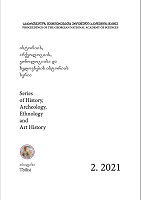სამედიცინო განათლების რეფორმა საქართველოში: გამოცდილება, მომავლის ხედვა
Medical education reform in Georgia: experience & vision for the future
Author(s): Avtandil Jorbenadze, Tengiz VerulavaSubject(s): Vocational Education, Higher Education , History of Education, State/Government and Education, Health and medicine and law, EU-Approach / EU-Accession / EU-Development, Sociology of Education
Published by: საქართველოს მეცნიერებათა ეროვნული აკადემიის გამომცემლობა
Keywords: medical education; reform; Georgia;
Summary/Abstract: As a result of the reorientation in the health sector in Georgia, the foundation was laid for a new system of medical education, built on modern principles. However, the main difficulty in implementing the reforms was the scarce and incomplete state funding of continuing medical education. The health care system suffered from a chronic lack of funding, as the state often did not fulfill its promised obligations. As a result, continuing medical education and recertification cost doctors a significant amount of money. Since 2003, the approach to the system of continuing medical education has changed, according to which the medical market should be based on selfregulation mechanisms, and medical personnel should be guided by the principles of self-development. As a result, since 2006, continuing medical education of medical personnel has ceased to be a prerequisite. Mechanisms for re-certification of doctors have also been abolished. Currently, continuing medical education in Georgia is voluntary. A certificate of independent medical practice is issued for life and a doctor is not required to re-certify. For comparison, in the overwhelming majority of European countries, participation in continuing medical education is mandatory. For example, in Austria, Germany, Italy, Switzerland and Hungary, continuing medical education is compulsory for physicians, while in Norway it is compulsory for general practitioners. The country’s existing medical education system (higher education, residency, continuing medical education and professional development) needs further reform in order to balance the new flow of doctors in the health sector and increase the role of nurses. Given that there is a direct relationship between patient safety, quality of medical care and continuing medical education, it is necessary to ensure compulsory continuing medical education based on the best international experience. Georgia is a European-oriented country, we are likely to soon become members of the European Union, and therefore, along with many other parameters, our medical education system must develop in accordance with the requirements of the European Union.
- Issue Year: 2021
- Issue No: 2
- Page Range: 140-162
- Page Count: 23
- Language: Georgian

